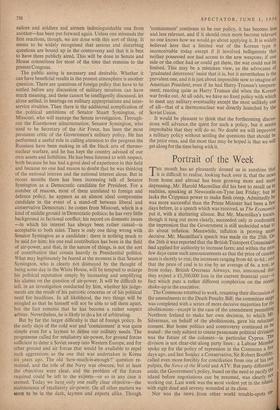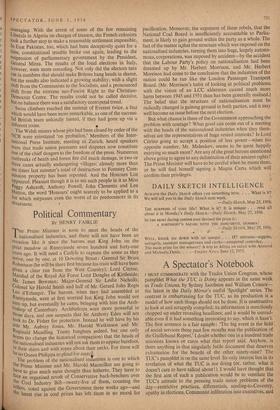Portrait of the Week
THE month has so pleasantly doused us in sunshine that it is difficult to realise, looking back over it, that the news from home and abroad has been growing more and more depressing. Mr. Harold. Macmillan did his best to recall us to realities, speaking at Newcastle-on-Tyne last Friday; but he lacks the Crippsian power to make flesh creep. Admittedly he was more successful than the Prime Minister had been a few days before, in a speech which was received, as The Economist put it, with a shattering silence. But Mr. Macmillan's tocsin. though it rang out more clearly, succeeded only in confirming the impression that the Government is still undecided what t° do about inflation. Meanwhile, inflation is proving more decisive. Mr. Macmillan's speech was made on the 25th. 011 the 26th it was reported that, the British. Transport Commission had applied for authority to increase fares; and within the next few days came such announcements as that the price of cinema, seats is shortly to rise, the increases ranging from 4d. to 6d.; and that the price of coal is to rise by an average of 6s. a ton, as from today. British Overseas Airways, too, announced that they expect a £1,500,000 loss in the current financial year-9 fact which puts a rather different complexion on the recent shake-up in the executive. The Commons returned to work, resuming their discussion of the amendments to the Death Penalty Bill; the committee stage was completed with a series of more decisive majorities for the abolitionists—except in the case of the amendment permitting Northern Ireland to make her own decision, to which Mr. Silverman, on behalf of the abolitionists, gave his reluctant consent. But home politics and controversy continued to be muted: the only subject to create passionate political ditiisions was the future of the colonies—in particular, Cyprus. Tile., division is not clear-cut along party lines : a Labour Membe' spoke up for the policy of repression in the Commons a feW days ago, and last Sunday a Conservative, Sir Robert Booth* called even more forcibly for conciliation from one of his tw° pulpits, the News of the World and ATV. But party differences aside, the Government's policy, based on the need to pacify the t island before negotiations can be resumed, was clearly 0,, working out. Last week was the most violent yet in the island with eight dead and seventy wounded at its close. Nor was the news from other world trouble-spots e°' eouraging. With the arrest of some of the few remaining Liberals in Algeria on charges of treason, the French colonists took a further step to make a reasonable settlement impossible. In East Pakistan, too, which had been deceptively quiet for a time, constitutional trouble broke out again, leading to the suspension of parliamentary government by the President, General Mirza. The results of the local elections in Italy, however, were more consoling. Not only did the electors turn out in numbers that should make Britons hang heads in shame, but the results also indicated a growing stability; with a slight shift from the Communists to the Socialists, and a pronounced shift from the extreme neo-Fascist Right to the Christian- Democrat Centre. The results could not be called decisive, but on balance there was a satisfactory centripetal trend.
Swiss climbers reached the summit of Everest twice, a feat Which would have been more remarkable, as one of the success- ful British team unkindly hinted, if they had gone up via a different route. • The Welsh miners whose pits had been closed by order of the NCB were reinstated `on probation.' Members of the Inter- national Press Institute, meeting at Zurich, heard speakers Warn that trade union pressures and disputes now constitute one of the chief dangers to the freedom of the press. Numerous outbreaks of heath and forest fire did much damage, in two or three cases actually endangering villages; already more than ten times last summer's total of destruction to Forestry Com- mission property has been reported. And the Honours List appeared. Pleasant though it is to see such people In it as Miss Peggy Ashcroft, Anthony Powell, John Clements and Len rtutton, the word 'Honours' ought scarcely to be applied to a list which surpasses even the worst of its predecessors in its dreariness. •



































 Previous page
Previous page